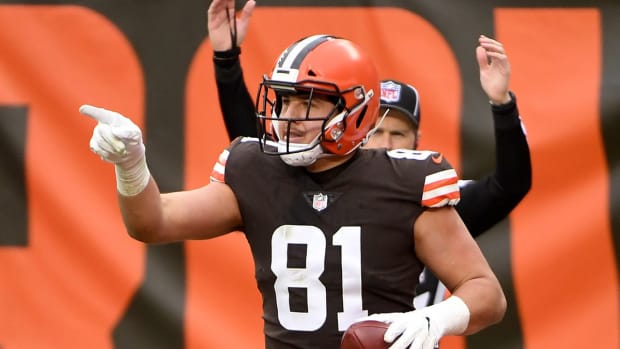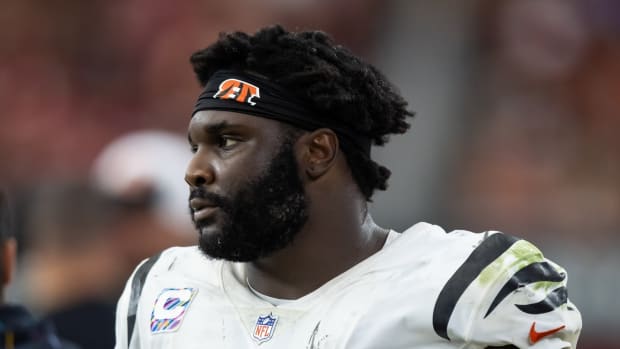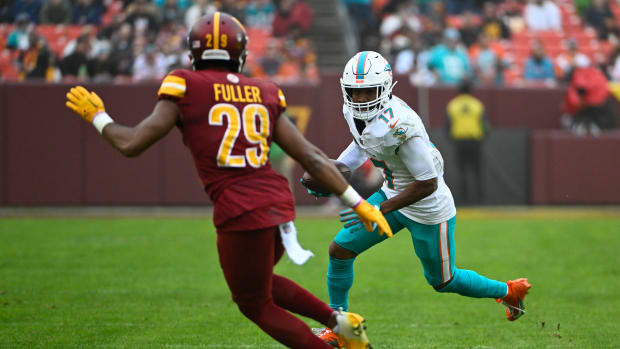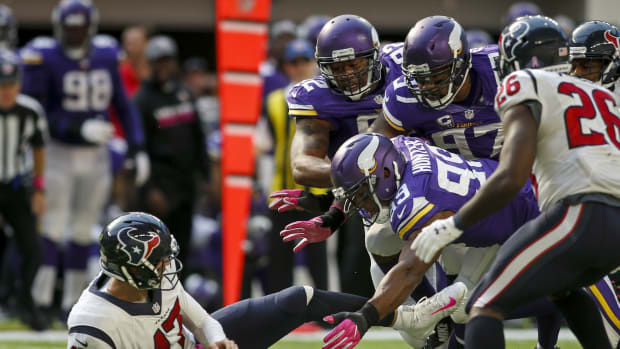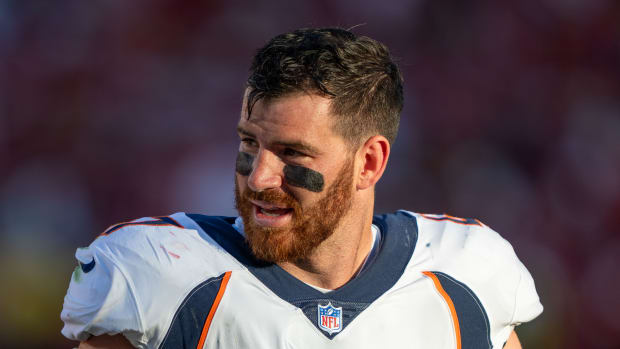How Leonard Fournette Found His Footing
Leonard Fournette is weaving through traffic, whistling past his competitors and hitting speeds no person should tempt.
Behind the wheel of America’s fastest SUV, he maneuvers across the roads of his hometown in a way that some might call reckless—others, exhilarating. The Dodge Durango Hellcat embodies its driver, possessing elite speed for its powerful build and intense torque for its substantial size.
It’s July, one of the last days before the start of another training camp, and this is Fournette’s very first chance to tinker with his new, $80,000 toy. Its engine is purring. Fournette smashes the throttle into the floorboard to show that, yes, the Hellcat can hit 60 miles an hour in under four seconds. Given enough time, it can eclipse 180 mph. Thankfully, Fournette stops at 110. He’s smiling ear to ear; his passengers, meanwhile, are pale white.
Along I-10 in New Orleans, fellow drivers watching the man behind the wheel of this torpedo on wheels must be wondering, Where is he going? The question they should be asking is, Where has he been? For Fournette, at this point in his life and career, the destination isn’t as important as the origin. The answer is in a dark, deep hole that he helped dig. Football was no longer fun. It was no longer easy. He was cut from a team for the first time in his life. He questioned his future.
He crawled into that hole, isolated himself and considered ending a career that never reached its expected pinnacle.
In four years of high school, three years of college and three years in the NFL, Fournette, the most elite high school tailback in a decade, the No. 1–ranked recruit in America, the fourth pick in the NFL draft, had never won a championship. For that unimaginable skid to finally end, in Super Bowl LV, some six months after he crawled into that hole, is a story that seems more fiction than reality.
But here he is, speeding across New Orleans, a Super Bowl champion. This time last year, it was nearly impossible to envision that description associated with Fournette. But his mother, Lory, describes him in even more surprising terms: “He’s come from the cocoon, from the dark place, and is blossoming,” she says. Leonard Fournette: the butterfly. But before that imagery sets, she adds a more fitting edge. “And he came back for revenge.”
In the photo, Leonard Fournette and a teammate are showing off their diamond-encrusted, gold Super Bowl rings, their hands nearly interlocked, the jewelry sparkling.
Fournette has one such ring. The teammate has seven.
During the Buccaneers’ run to a Super Bowl title last winter, it seemed like each morning Fournette received a 5 a.m. text from that teammate, Tom Brady, about that week’s opponent. Fournette says he was an “eyewitness to greatness. You see why he wins. He’s been playing for 22 years. He’s seen every defense and played against every defensive coordinator. Not too much you can throw at him that he’s not going to recognize.”
Fournette never really imagined he’d get handoffs from arguably the greatest quarterback in NFL history. Then again, maybe this is a corrective measure from the football gods. For the first time in his career, Fournette claims, he “really has a quarterback.”
The data backs him up. In his previous six seasons—three at LSU and three with the Jaguars—none of his teams ranked in the top half of their respective leagues in passing. Four of the six averaged less than 200 yards per game through the air. Last year, Brady and the Bucs ranked second in the NFL with 289 yards passing per game.
Meanwhile, Fournette evolved into the team’s most lethal running threat in the playoffs. In four playoff games, he scored seven touchdowns, three on the ground and four through the air. He ran for 300 yards over the four postseason games—just 67 yards shy of his rushing total during the 16-game regular season.
He can’t really explain the output, except to harken back to a conversation with coach Bruce Arians toward the end of the regular season. Before Week 14 against the Vikings, Fournette had gained 46 yards on 19 carries. He approached the coach with a message: I’m pissed, he told him, you’re wasting my time.
He thought seriously about quitting, even suggesting that Arians release him. The coach told him to think about it. Fournette missed the Vikings game. He returned to the team the next week. Less than a month later, he started the playoff jaunt that earned him the moniker “Playoff Lenny.”
“It was my time,” he says. “I told my coach, ‘This s--- is done.’ I was waiting for the opportunity. Everybody was calling me overrated and a bust. It’s redemption for me. I wanted to show everybody why I got drafted in the first round.”
It felt like a weight lifted. It felt like vindication, the reward for navigating the unforeseen obstacles of the past eight years.
Fournette’s career at LSU and stint with the Jaguars both ended in disappointment. He never won even a division title with the Tigers. Ahead of his final season, he sprained his ankle in preseason camp, reinjured it multiple times through the year, saw his coach (Les Miles) get fired, and fell 723 yards short of breaking the school’s all-time rushing record—something of which he still holds regrets.
In Jacksonville, the pressure built and built and exploded in frustration. He endured a one-game suspension for fighting, threatened to fight an opposing fan, often showed up out of shape and tore 5% of his hamstring. In August 2020, coach Doug Marrone summoned Fournette to his office.
“We are going to let you go,” he told the tailback.
“That’s how he said it,” Fournette recalls. “I was like, ‘Damn.’ ”
A year before, the running back says he fought for his coach, telling team ownership not to fire Marrone after a second straight losing season. Then, months later, Marrone cut him. “When it came to me and my family, he kicked my a-- to the curb,” says Fournette, though he insists he has no ill will toward Marrone. “I had to really understand the business aspect of the NFL. It opened my eyes.”
For two weeks, Fournette went into hiding. He isolated himself at his New Orleans home, surrounded by only his family. He has a son, Leonard IV, who lives in Baton Rouge, and a daughter, Lyric, and another son, Legend, who live in the New Orleans area. He didn’t take any calls, Lory Fournette says. He didn’t take any visits. Was his career over?
“That messed me up,” he says. “I was confused. Football has been the easiest thing my whole life.”
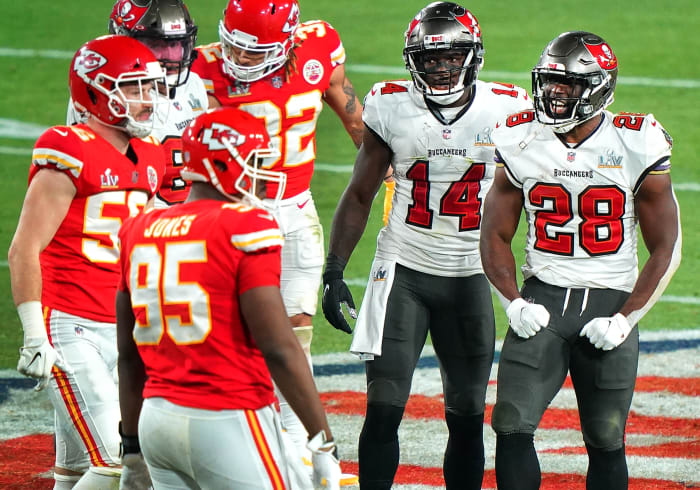
Fournette's postseason run included 89 yards and a touchdown in Super Bowl LV.
Erick W. Rasco/Sports Illustrated
And then, the Buccaneers called. The playoff run followed. And Leonard Fournette, the Leonard Fournette, the hero of New Orleans, the generational high school talent, finally won a championship.
Since then, says his father, Leonard Jr., he’s been “a whole different person.”
The momentum has carried into this season. As the 6–1 Bucs prepare for a visit to New Orleans, Fournette had 413 rushing yards and a career-best 4.4 average, as well as four touchdowns. Tampa Bay is in control of the NFC South, favorites to make another deep playoff run.
Back in his flashy, new Hellcat, Fournette is giving a tour of the 7th Ward, the impoverished, low-income area of New Orleans from where he originally hails. He crisscrosses a neighborhood of broken chain-link fences, dilapidated roads and small shotgun homes, some still abandoned from Hurricane Katrina’s wrath. The storm completely flooded this region of the city. He notes landmarks as he drives past them.
“There’s where my coach got shot in the head,” he says gesturing toward Hunter’s Field, a park tucked underneath the overpass of I-10 in the middle of the 7th Ward. The incident triggered his family to leave the neighborhood and move to Slidell, a city about 30 miles east of New Orleans.
Later on, he passes an old grassy lot adjacent to a church. That’s where Fournette first played youth football. His grandmother’s home, painted in pink with crumbling concrete steps, rises on the right. He plans to have it renovated.
Along one avenue, Fournette stops the car and points to a corner. Here, he says, his father was shot from inside his car when Fournette was a young child. The gunman, still unidentified, fired five bullets into the vehicle. Two hit his dad, one nearly killed him, ripping open his stomach.
A few blocks away, Fournette’s high school, St. Augustine, is a mass of yellow brick protruding from the neighborhood. Fournette can remember nearby gunfire erupting during football practices. Coaches would tell players to drop to the ground. Minutes later, practice would resume.
Fournette wears jersey No. 7 to represent this place. He knows what goes on here isn’t right, but he also knows that his roots are his roots. Dozens of family members still live here. In fact, he whips around one corner to find a handful of Fournette’s cousins milling about. In the distance, behind a vehicle, one person is discreetly exchanging cash for a small plastic bag.
Later during the drive, a man Fournette knows pokes his head inside the vehicle and flashes a wad of $20 bills. “You know how it is!” he screams. “We gettin’ money ’round here!” Welcome to the 7th Ward.
“Most of my family is in jail,” Fournette later says.
Finally, the tour winds down and Fournette unloads his passengers. He has to get going. He will soon report to Buccaneers training camp to embark on a quest he’s never experienced before: defending a championship.
But before going, he issues a warning to a group of media members parked in front of his old high school. Better not stay too long, he says. Fournette was just notified that a message has been sent to neighborhood residents alerting them to a drive-by shooting scheduled for that afternoon.
These are his parting words before he speeds off, into the light.
More NFL Coverage:
• The Mystery of the Original Rams Horns Helmet
• Dak Prescott’s Heal Turn
• How Orlando Brown Jr. Honored His Father and Forged a New Path

































